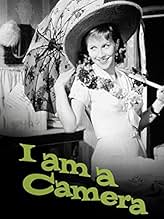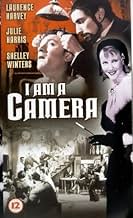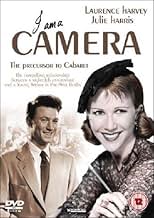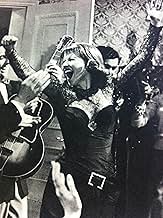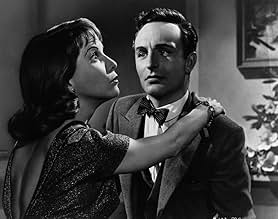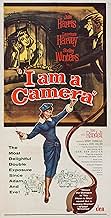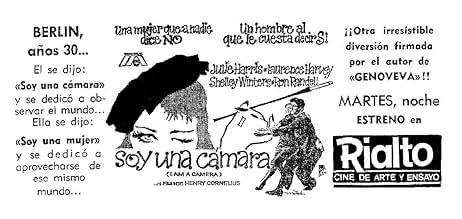VALUTAZIONE IMDb
6,3/10
703
LA TUA VALUTAZIONE
Aggiungi una trama nella tua linguaIn Weimar-era Berlin, an aspiring writer strikes up a friendship with a vivacious, penniless singer.In Weimar-era Berlin, an aspiring writer strikes up a friendship with a vivacious, penniless singer.In Weimar-era Berlin, an aspiring writer strikes up a friendship with a vivacious, penniless singer.
- Regia
- Sceneggiatura
- Star
- Nominato ai 1 BAFTA Award
- 1 candidatura in totale
William Adams
- Old Doctor
- (non citato nei titoli originali)
Ian Ainsley
- Minor Role
- (non citato nei titoli originali)
Charles Andre
- Waiter
- (non citato nei titoli originali)
Julia Arnall
- Model
- (non citato nei titoli originali)
Jack Arrow
- Troika Doorman
- (non citato nei titoli originali)
Recensioni in evidenza
In Isherwood's preface to his "Berlin Stories" he talks about meeting Julie Harris backstage during "Camera's" Broadway run, and seeing her as the quintessential Sally Bowles. Maybe he was being gracious, but we couldn't have agreed more. Filled with witty dialogue, this film moved at a brisk pace, and yet when it was over, we felt as if we had seen an in depth slice of the demimonde life in pre-war Berlin. Harris was simply fascinating - what a beautiful smile! Highly recommended (if you can find it) for those who find this time and place irresistible.
Nice details too, including quick shots of Berlin "boot-girls" (dominatrix ladies of the night) and the El Dorado, one of the city's most colorful transvestite bars (even the murals inside are spot on!)
Nice details too, including quick shots of Berlin "boot-girls" (dominatrix ladies of the night) and the El Dorado, one of the city's most colorful transvestite bars (even the murals inside are spot on!)
This film was inexplicably made in England, and though there is some staginess - noticably in the yelling of some of the actors - director Henry Cornelius provides some clever imagery eg the decadence of the Berlin nightclub by a piglet and two smashing beerglasses, and Christopher standing at a window in the past bringing out us out of the narrative flashback. It also features a remarkable hotel party setpiece.
The infamous role of Sally Bowles is written as a pretentious innocent, and the knowledge that Isherwood was gay feeds into the notion of Sally as a coded drag queen, or at least, an effeminate gay man. The screenplay is full of gay subtext eg Christopher's narcissism demonstrated in his lotions and weights and boufant hairstyle, Sally's descriptions of male musculature, the repeated use of sausages, Sally telling Christopher he doesn't "understand" women, his describing her sex appeal as "inadequate", the rectal thermometer, his massage, his confession that he is "not the marrying type", and fear of being "embroiled" with her. The major difference between this treatment and that of Bob Fosse's Cabaret is the Clive Mortimer character, who here is heterosexual, but would be later turned into the bisexual Max.
Julie Harris performed the role of Sally Bowles on Broadway, and one's opinion of her performance cannot help but be influenced by Liza Minnelli (as is one's opinion of the film as a piece). Harris works against her basic miscasting (she doesn't even use an English accent when we are told Sally is English) because Sally is such an artificial creation. She is like an Actors Studio version of a junior Auntie Mame, and even when her antics become tiresome, she is still far more likeable than Laurence Harvey's starched and basically asexual Christopher. Harris may not have Minnelli's street urchin vulnerability, but she has some inspired moments - posing in front of a mirror wearing a mink coat, her drunken giggling, looking behind a silk scarf, or licking milk with a wild tongue.
The infamous role of Sally Bowles is written as a pretentious innocent, and the knowledge that Isherwood was gay feeds into the notion of Sally as a coded drag queen, or at least, an effeminate gay man. The screenplay is full of gay subtext eg Christopher's narcissism demonstrated in his lotions and weights and boufant hairstyle, Sally's descriptions of male musculature, the repeated use of sausages, Sally telling Christopher he doesn't "understand" women, his describing her sex appeal as "inadequate", the rectal thermometer, his massage, his confession that he is "not the marrying type", and fear of being "embroiled" with her. The major difference between this treatment and that of Bob Fosse's Cabaret is the Clive Mortimer character, who here is heterosexual, but would be later turned into the bisexual Max.
Julie Harris performed the role of Sally Bowles on Broadway, and one's opinion of her performance cannot help but be influenced by Liza Minnelli (as is one's opinion of the film as a piece). Harris works against her basic miscasting (she doesn't even use an English accent when we are told Sally is English) because Sally is such an artificial creation. She is like an Actors Studio version of a junior Auntie Mame, and even when her antics become tiresome, she is still far more likeable than Laurence Harvey's starched and basically asexual Christopher. Harris may not have Minnelli's street urchin vulnerability, but she has some inspired moments - posing in front of a mirror wearing a mink coat, her drunken giggling, looking behind a silk scarf, or licking milk with a wild tongue.
Lots of history behind this story of Sally Bowles, party-girl in 1930s Berlin who befriends a stolid English gent amidst the Nazi uprising. Curious, rather indifferent drama isn't helped by Julie Harris as Bowles; Harris tries hard, but she's too intelligent a presence to be convincing as a flake and her big moments don't come off. Non-flashy adaptation of both Christopher Isherwood's "Berlin Stories" and John Van Druten's subsequent play, it is sure to interest fans of Bob Fosse's "Cabaret" as a great deal of the dialogue mirrors passages in "Cabaret" almost verbatim. Those who stumble upon it unawares will probably find the movie stilted and dull. It's little more than a footnote now in this chain of literature and cinematic events. ** from ****
I only watched this film because I was determined to spot Patrick McGoohan in an early film role. I watched Laurence Harvey as the aimless, charming character he plays, thinking of his breakthrough role as the surly grasping man at the top. Good old Anton Diffring flashing his gnashers in all their gap-toothed glory. Shelley Winters as an innocent rather than a Vamp. It was all jolly good stuff. I kept wondering where I'd seen the Sally Bowles character before.
My McGoohan moment came and went, he went through a gamut of emotion, exercising his foreign accent in his entrance, quite keen, then looking thoroughly bemused as his part became slapstick, not to say fed up by the last you saw of him. I almost packed the film up at that point, but decided I might as well see the end. It had become a little surreal by then so I was curious to see how they would wrap it up.
In what I would guess would have been the theatrical Third Act, it all became clear. The affable nonsense of the earlier scenes was all thrown into focus by the stark, grim realisation that evil was about to take over the world. The characters each found their own ways to escape or avoid it and I was pleased for all of them. It was in these final scenes that it suddenly dawned on me who Sally Bowles was. She was the timid, tragic victim in one of my favourite ever films: 'The Haunting'. The actress I was always confusing in my mind with Deborah Kerr, as a fragile feminine beauty.
Some readers may now be remarking 'What a dork! It says Julie Harris on the cover!' But I didn't remember this person as Julie Harris. The name meant nothing. I remembered her as poor Eleanor and Eleanor has haunted me for years. I prefer to believe that, rather than me being an unobservant dork, it is a tribute to the talent of Ms Harris that for most of this movie I simply didn't recognise her.
Anyhow, the point is that, but for my compulsion to watch a movie just to see an early bit-part of one favourite, I would never have seen a starring role of another. I find a certain peace in the discovery.
My McGoohan moment came and went, he went through a gamut of emotion, exercising his foreign accent in his entrance, quite keen, then looking thoroughly bemused as his part became slapstick, not to say fed up by the last you saw of him. I almost packed the film up at that point, but decided I might as well see the end. It had become a little surreal by then so I was curious to see how they would wrap it up.
In what I would guess would have been the theatrical Third Act, it all became clear. The affable nonsense of the earlier scenes was all thrown into focus by the stark, grim realisation that evil was about to take over the world. The characters each found their own ways to escape or avoid it and I was pleased for all of them. It was in these final scenes that it suddenly dawned on me who Sally Bowles was. She was the timid, tragic victim in one of my favourite ever films: 'The Haunting'. The actress I was always confusing in my mind with Deborah Kerr, as a fragile feminine beauty.
Some readers may now be remarking 'What a dork! It says Julie Harris on the cover!' But I didn't remember this person as Julie Harris. The name meant nothing. I remembered her as poor Eleanor and Eleanor has haunted me for years. I prefer to believe that, rather than me being an unobservant dork, it is a tribute to the talent of Ms Harris that for most of this movie I simply didn't recognise her.
Anyhow, the point is that, but for my compulsion to watch a movie just to see an early bit-part of one favourite, I would never have seen a starring role of another. I find a certain peace in the discovery.
In this film Julie Harris reprises her Tony award-winning performance as Sally Bowles bumming in 1920s Berlin. I loved Julie and envied Sally and her carefree ways, but I was young then. While the film may not be "important," it does tell us something about life and culture based upon Christopher Isherwood's evocation of fun-loving pre-Hitler Berlin. It's about a world and time long vanished & highly lamented by aging romantics such as I. So temper your critical faculties and just enjoy a stunning performance by Julie Harris who has won more Tony Awards (5) than any other actress.
Lo sapevi?
- QuizDespite being far less salacious than the 1951 stage play on which it was based, this film adaptation received a "Condemned" rating from the Legion of Decency, a Roman Catholic organization that passed moral judgments on films between 1933 and 1965. This rating was also given to Psyco (1960), A qualcuno piace caldo (1959) and Fino all'ultimo respiro (1960).
- BlooperWhilst most of the film is a flashback set in the early 1930s, all the costumes and hairstyles worn are straight out of the early 1950s.
- Citazioni
Christopher Isherwood: [to Sally] Any mess you get into, you try and get out of by using your extremely inadequate sex appeal.
- Curiosità sui creditiIn opening credits, Shelley Winters is misspelled "Shelly".
- ConnessioniFeatured in Omnibus: Christopher Isherwood: A Born Foreigner (1969)
- Colonne sonoreI Saw Him in a Café in Berlin
(uncredited)
Music by Ralph Maria Siegel
English lyrics by Paul Dehn
Sung by Liselotte Malkowsky
[Sally (Julie Harris) sings the song in her club act]
I più visti
Accedi per valutare e creare un elenco di titoli salvati per ottenere consigli personalizzati
- How long is I Am a Camera?Powered by Alexa
Dettagli
- Tempo di esecuzione
- 1h 38min(98 min)
- Colore
- Proporzioni
- 1.37 : 1
Contribuisci a questa pagina
Suggerisci una modifica o aggiungi i contenuti mancanti


